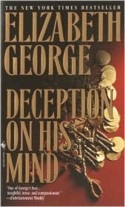 From the front flap:
From the front flap:
Balford-le-Nez is a dying seatown on the coast of Essex. But when a member of the town’s small but growing Asian* community is found dead on its beach, his neck broken, sleepy Balford-le-Nez ignites. Working solo, without her long-time partner Detective Inspector Thomas Lynley, Sergeant Barbara Havers must probe not only the mind of a murderer and a case very close to her own heart, but the terrible price people pay for deceiving others… and themselves.
* Evidently, Brits use the term “Asian” to apply to people whom Americans would call “Middle Eastern.”
Review:
As a fan of Detective Sergeant Barbara Havers, I was chuffed to discover that Deception on His Mind features Barbara in the role of main protagonist, as her superior officer, Detective Inspector Thomas Lynley, is away on his honeymoon. While I like Barbara even more after this outing, especially after she gives voice to one long-overdue “sod you” in the book’s final pages, I unexpectedly found myself missing Lynley.
This isn’t Barbara’s fault at all, however. Instead, I lay the blame at Detective Inspector Emily Barlow, an acquaintance of Barbara’s who is the lead investigator of the murder of Haytham Querashi, a Pakistani immigrant who has come to England to marry Sahlah Malik, daughter of a local businessman, and work in her father’s factory. Barbara gets involved in the case when her neighbor, Taymullah Azhar, is summoned by his cousin (Sahlah’s brother Mohannad) to help advise the family. She wants to help him out and when she discovers that Barlow is heading up the case, she offers to assist. It soon becomes apparent that Barlow harbors racist attitudes, as she spends the entire book focused on pinning the crime on Mohannad and balking any time Barbara finds evidence that suggests a white person might have been involved.
This, as you might imagine, gets incredibly frustrating. In fact, I think the whole theme of the book must be “people seeing only what they want to see,” because there are several characters who exhibit this quality. Sahlah’s friend, Rachel, is deluded that pregnant Sahlah will be able to have a happy-ever-after romance with rich and white Theo Shaw. And, failing that, that Sahlah would be content to spend her days living with her in a cozy flat by the sea. She and Sahlah have several tedious conversations about the unlikelihood of these events occurring, but Rachel never seems to get it. Meanwhile, Rachel’s mum, fit and attractive Connie, refuses to see facially deformed Rachel as anything but lovely and Yumn, Mohannad’s odious wife, sees herself as Allah’s gift to humanity for her ability to bear sons for her husband and abuses her position to order Sahlah about imperiously. (She also seems to have an unhealthy fixation with her children’s nether regions.)
Icky and irritating characters aside, the investigation into Querashi’s death is fairly interesting. I learned a new bit of British slang—cottaging—and really enjoyed the trust that develops between Barbara and Azhar. They’re an unlikely match, but now I totally want them to get together, especially since Azhar’s ray-of-sunshine daughter, Hadiyyah, loves Barbara so much and is loved in return. Events culminate in a rather exciting boat chase, and I liked that Barlow’s instinctive suspicions aren’t entirely wrong, after all. I was confused by a couple of things, however, and especially disappointed when Barbara failed to mention a bit of evidence that would prove Querashi’s good intentions when Barlow got it into her head that he’d been blackmailing Mohannad. I think George dropped the ball there.
Overall, this is not my favorite Lynley mystery, but it shows Barbara in a good light and offers interesting ramifications for her in the future. I’ve just discovered there’s a new Lynley mystery due in January, and my goal is to get caught up by then, so expect more reviews of this series in the months to come.




“Evidently, Brits use the term “Asian” to apply to people whom Americans would call “Middle Eastern.””
No – we use the word “Asian” to apply to people from the Indian sub-continent (particularly India, Pakistan, Sri Lanka and Bangladesh, which account for most Asian immigrants entering the UK over the past 50 years or so). Middle Easterners are referred to as just that (or else, often erroneously, as “Arabs”).
Ah, I see. I think Pakistan gets included in the Middle East for us, especially now that they’re so often in the news in conjunction with their western neighbors and not their eastern ones. I’m pretty sure “Asian” is used here for people from those nations east of India, so I guess “Indian” gets its own designation.